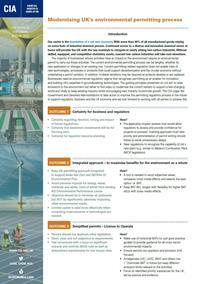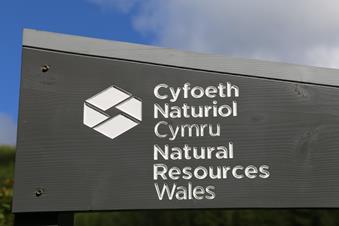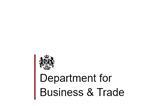Our sector is the foundation of a net zero economy. With more than 95% of all manufactured goods relying on some form of industrial chemical process. Continued access to a diverse and innovative chemical sector at home will provide the UK with the raw materials to compete in newly arising low-carbon industries. Without skilled, equipped, and competitive chemistry assets, nascent low carbon industries will take root elsewhere.
The majority of businesses whose activities have an impact on the environment require an environmental permit to carry out those activities. The current environmental permitting process can be lengthy, whether its new application or changes to an existing one. Current permitting related regulation does not enable trials of new technologies, processes or products that could support decarbonisation and the circular economy without undertaking a permit variation. In addition, multiple variations may be required as projects develop or are replaced. Businesses need an environmental regulatory regime that recognises permitting as an enabler for innovation and building UK’s expertise in groundbreaking technologies. The guiding principles presented do not aim to relax emissions to the environment but rather to find ways to modernise the current system to support a fast-changing world and vitally to keep existing industry whilst encouraging new Industry to promote growth. The CIA urges the Government and Devolved Administrations to take action to improve the permitting regulatory process in the future to support regulators, business and the UK economy and we look forward to working with all parties to achieve this.
Outcome 1: Certainty for business and regulation
- Certainty regarding direction, timing and impact of future regulations.
- Certainty that abatement investments will be for the long term.
- Certainty for regulator resource planning.
How?
- Pre-application impact reviews that would allow regulators to assess and provide confidence for projects to proceed. Granting approvals must take priority and administration of permit writing should follow to avoid unnecessary delays.
- New regulations to recognise the capability of old v new plant (e.g. similar to Medium Combustion Plant (MCP) legislation).
Outcome 2: Integrated approach – to maximise benefits for the environment as a whole
- Keep UK permitting approach integrated to support wider Net Zero and DEFRA’s 25 Environmental Plan.
- Avoid perverse impacts for energy, water, materials and waste, none of which have binding IED Environmental Performance Levels.
- Objective should be to minimise air pollutants but NOT by significantly adversely impacting other environmental media.
- Limited capital is used more effectively when competing improvements or technologies are needed.
How?
- A tool is needed to avoid subjective views, compares cross media effects and selects the best option i.e. BAT.
- Keep BAT AEL ranges with flexibility for higher BAT AEL’s with cross media effects.
Outcome 3: Simplified permits – Licence to Operate
- Permits should not duplicate other legislation.
- Short, clear and not subjective in requirements.
- Fast turnaround with a focus on significant impacts and controls (80/20 rule) as well as streamlined requirements for low impact.
How?
- Make use of horizontal BATs (or just good practice guides) to provide guidance for all cross sector environmental impacts.
- Ensure permits are operation and emission limit focused.
- Amalgamate LVIC, LVOC, WGC and others into ‘Chemicals BAT’ in future but keep different emission limits relevant to the activities.
- Focus on identified priority substances for the UK, led by science and evidence.
Find out more about our other three outcomes.

Modernising UK’s environmental permitting process
The guiding principles presented do not aim to relax emissions to the environment but rather to find ways to modernise the current system to support a fast-changing world and vitally to keep existing industry whilst encouraging new Industry to promote growth.
DOWNLOAD






















